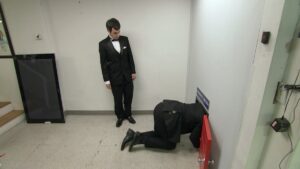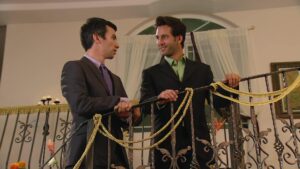This article examines four Nathan For You episodes that chart the themes and ideas that drive The Rehearsal and might—maybe, maybe—give us some insight into what Fielder is thinking as he unleashes the finale, revealing the next vista of his constantly evolving, frequently perplexing, and morally ambiguous worlds of pure imagination.
- 5 Classic South Park Episodes That Are Still Relevant Today
- Everything You Need To Know About The GOT Spin-off Series In Development Right Now
Four Episodes Of Nathan For You That Laid The Foundation For The Rehearsal
Electronics Store

It’s easy to forget that Fielder is a comedian, and that his shows are still among the most riotously funny on television. So, let “Electronics Store” serve as an antidote to our own academic snooping. Sure, there are a few moments of profound moral ambiguity.
However, “Electronics Store” also includes images of “Fielder” dressed up as his vision of a Hot Topic manager, his attempts to coach his cheerful accomplices through blatantly perjurious legal testimony, and multiple instances when determined bargain hunters dressed in full black tie regalia crawl through a tiny Alice In Wonderland door, only to be confronted by a living alligator standing between them and a discount TV. It could be evil, but it’s also hilarious as hell.
Haunted House / The Hunk

One of Nathan For You’s central jokes is that “Fielder” can never seem to keep himself, or his desperate loneliness, out of any of his schemes. That’s present from the first episode, which kicks off the running gag of the comedian attempting to turn his business interactions with his subjects into some kind of unwanted hang session, but it comes to the fore in season one’s “The Hunk,” in which he creates a fake reality dating show ostensibly designed to help “Nathan” become more comfortable around women.
Smokers Allowed

The meta throughline of “Smokers Allowed” is obvious, as Fielder’s attempts to recreate the success of that first “show” gradually absorb more and more of poor Ellen’s bar. But, more than just an early foray into the world of elaborate, life-based rehearsals, “Smokers” asks, for the first and not the last time, why Fielder is moved to do the things he does.
In the episode’s most meme-worthy moment, “Fielder” hijacks a romantic scene between two of his performers to do a “exercise,” in which the actor is directed to look into his eyes and say “I love you.” Then repeat the process again and again. The discomfort grows as the repetitions increase, but so does a potent, if manufactured, emotional intensity. Later, in a scene reminiscent of one of The Rehearsal’s frequent real person/actor swaps, Fielder brings in the performer playing Ellen to repeat the bit—but this time, she appears to break character to tell him that she truly, genuinely loved his play. It’s a lovely moment.
Dumb Starbucks

Dumb Starbucks is significant for two reasons. The first is its ambition, which sees Fielder and his crew build an exact replica of a functioning Starbucks in search of that all-important comedic specificity. Fielder’s ideas have only grown in size over the years, and it’s easy to see “Dumb Starbucks” as a watershed moment in convincing TV executives that there was merit, and potentially huge free advertising, in supporting this strange, quiet Canadian guy’s increasingly bizarre plans.
